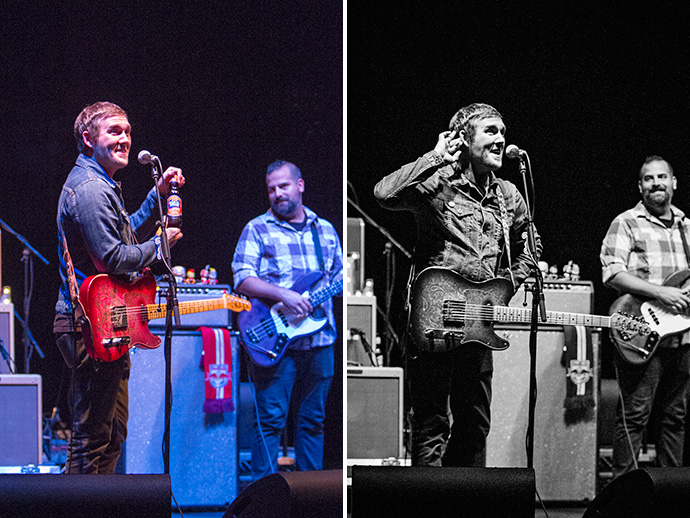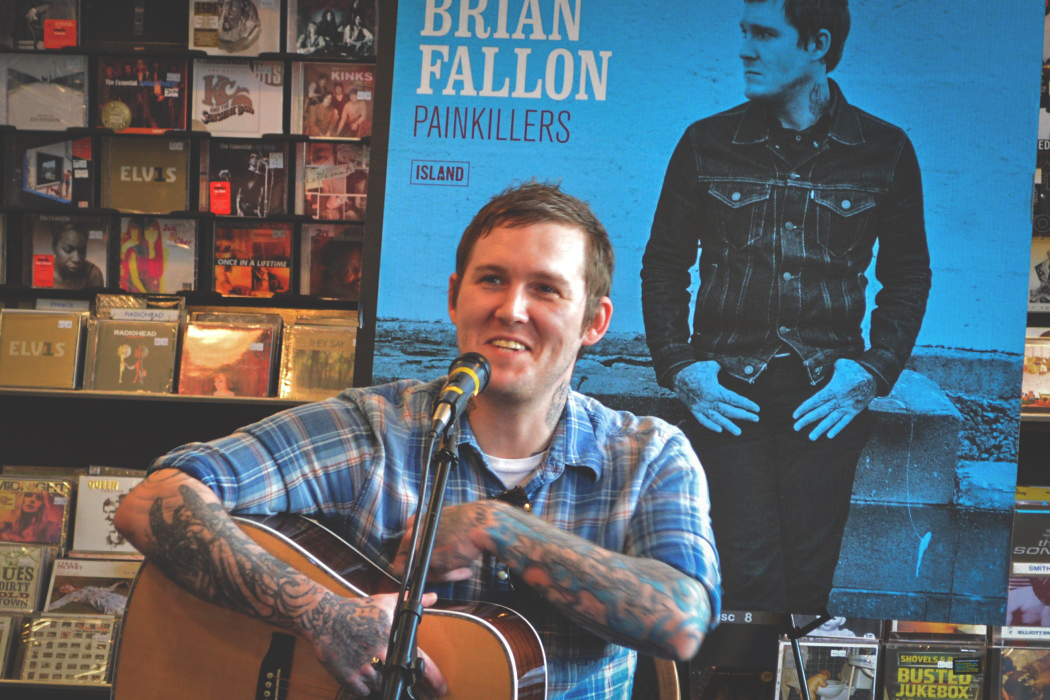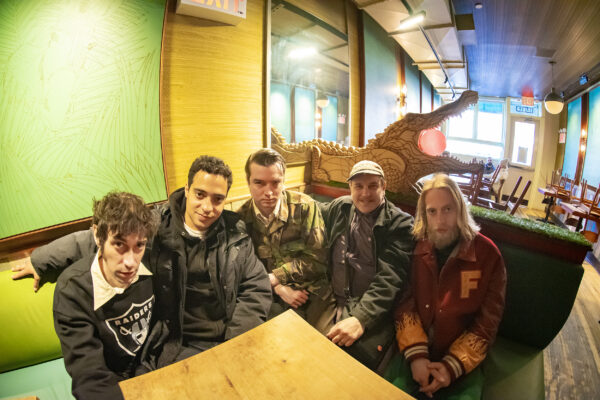If there were a gene that all great songwriters share, it wouldn’t be eye color or blood type, but the will and resolve to always tell the truth. Channeling that same vivid combination of honesty and feeling into his own work, authenticity has been at the heart of Brian Fallon’s music for almost a decade. Lighting up marquees both near and far from his home state of New Jersey since the mid 2000s, Fallon and his bandmates in The Gaslight Anthem would spend their twenties operating at near lightening speed. Making a total of five full-length studio albums in just seven years, they took their songs all over the world before eventually surprising fans with the news of their hiatus. Although when they made the decision to take a break, not even the groups frontman knew what would come next. Ushering in an entirely new phase of his career soon after, his first solo record, Painkillers, arrived in the spring of 2016 to colossal fanfare and glowing reviews. Yet initially, Fallon says he had been hesitant to pursue a project on his own. “I never wanted to be the guy who’s like, ‘Alright I’m going to leave my band, check this out, watch what I can do by myself. I’ve got all these cool little tricks that I can do, look at me everybody,’” he told Pancakes and Whiskey in early October. “That always sort of felt distasteful to me. So when the band decided that they were going to take a break, I then found myself in the position of well now you either have to stop making music and go do something else, or the option is to look into doing other songs that aren’t in the band. I was in a tough spot and I didn’t really know what to do because I had such a strong opinion about people who go off on their own.”
Pointing to his eventual collaboration with producer Butch Walker as a key factor in the development of Painkillers, he spoke about how they had crossed paths at a crucial point. “I needed to meet Butch at the time that I met Butch,” he said. “So it was like, you know how you have these serendipitous meetings in your life where -maybe even if someone is only there for a short time or whatever- but you just need certain people at certain times.” Encouraged by Walker, his concerns about making a solo record started to fade when he could see the situation from another perspective. “I spoke to Butch about it and he’s like, ‘Well you didn’t go off on your own. You guys all decided that you were going to take a break and then you decided to do a record, so it’s quite different than if you just were like, peace guys, see ya,’” he recalled. “So that comforted me.” And after demoing four tracks together- “Painkillers,” “Red Lights,” “Smoke” and “Nobody Wins”-Fallon heard something promising in the tapes of them “essentially goofing around,” that made him want to move forward.
Recalling that playback, the life-long musician talked about the joy and excitement that comes with taking an arrangement from a nascent sketch and building it into something that you can share with people. “That part of it, I don’t think that’ll ever get old for me, like the first time you hear something back and you think it’s exciting to yourself,” he said. “That’s what really makes it all worth it because it does feel like you’re a kid on Christmas morning every single time you write a song. You’ve done it before, but at some point you still look at it and go, ‘I don’t understand how there was nothing and now there’s something.’”

Brian Fallon @ The Wiltern
Bonding with Walker over a shared taste in music and gear, the songwriter described a loose, easy atmosphere once official recording began. “We sort of had this kindred spirit thing of liking the same stuff,” he remembered. And while Fallon admits that it can be difficult to leave projects behind after living with them everyday, his earlier apprehension surrounding Painkillers made its conclusion feel decidedly different. “Every record that I’ve ever done, the last week or so I’ll be like, ‘Ah, this is ending,’ and I’ll almost get upset about it,” he said. “I don’t want to leave. But with this one, it was oddly celebratory because it was done. I knew that it was done and I was so excited to hear it back because the whole process, you know, like going out and doing a solo record and sort of being like, ‘I don’t know if this is going to be good,’ and playing with musicians that I’ve never met ever before. I never played with Butch and I just met Mark [Stepro] the drummer, when we walked in the studio. That was the first day that I said, ‘Hi,’ to him. I just trusted Butch. I knew Catherine [Popper] well, so she was the only person I really knew in the whole session. And when we were done I couldn’t believe what I was hearing back.” Happy with the recordings, Fallon spoke about how the finished album represents everything that he wished to convey, a feeling he described as rare. “I never felt that way before, that everything I wanted to say was done.”
Viewing his own songs with a critical eye, he discussed his efforts to prevent repetition, before adding that he finds it pointless to pretend that it’s wholly avoidable. Crediting this and a bit of self-consciousness for frequent revisions during the writing process, Fallon discussed the mix of trepidation and enthusiasm that goes along with making records. “Being your own critic and pushing yourself takes a lot of discipline that you have to struggle to find,” he began. “But it is exciting at the same time because you know that anything is possible every time you write a record. Like literally anything is possible. You could make the next Dark Side of the Moon. You have no idea what’s going to come out until you start playing some chords or maybe playing a drumbeat or something. So it is exciting. And then I think discovering it on your own versus when you’re in a band with three other people, that’s its own fear and excitement at the same time.”
Yet when asked what most moves him to write these days, he spoke about how his inspirations have shifted overtime, leading him to look more closely at what’s happening around him. “Well now it’s different –recently- because I’m older and my life has changed so much now. I have kids and stuff so you sort of think about the world differently when you have that. When I was younger, I didn’t really pay attention to what was going on in the outside world. I just kind of thought, ‘Well, we’re in this insular bubble of being on tour and whatever’s going on.’ But then you start to think about the world affects your children, and I don’t know, because it’s an early thing. I know I’m thinking about it, but I don’t know if it will come out in the songs yet.”

Brian Fallon @ The Wiltern
Although one element that always seems to come out in the songs is the same candor that spills into his speech. Spend time with his music and you’ll recognize it as the same quick, unguarded nature that’s so acutely felt in Painkillers tracks like “Smoke” and “Among Other Foolish Things.” With a clear picture of the origins of each, he remembered writing both songs about a year apart, though only one of them came together in just fifteen minutes, without a note or word ever being changed. “Every once and a while, you’re really lucky with that,” he said of “Smoke,” before describing what it feels like to have a song come to life so rapidly. “There’s a beauty in that because it happens to every single songwriter and they’ll all tell you about how special that feels when something just falls out of the sky and lands in your lap. You feel dumbfounded because you know that it’s something that happened that was beyond your capability and you’re aware of that, so that’s one of those things that you get really grateful and excited for.”
Framing “Among Other Foolish Things” as a letter, Fallon got the idea for one of the records most memorable tracks while watching the 2007 Wes Anderson film, The Darjeeling Limited. As a huge admirer of the directors stories and soundtracks, the musician said that one of his goals in life is to see his own music chosen for an Anderson movie. “I love his films so much and also he always chooses these really melancholy, but yet bright songs,” he said. “So when I was watching the movie, I had heard a couple of the songs that are in there, like there’s the Kinks in there, and that melody in the beginning just came into my mind out of nowhere.” Lyrically inspired by events in his own life and not the film, Fallon spoke about how he doesn’t like to write songs based on other people’s work, before discussing how the opening line (“Lily, I don’t know how to start this letter”) came to him because he simply didn’t know how else to begin.
“Sometimes you just sit down and you just tell the truth, I guess, and then people, they either like it or they don’t.”
Watch the video for the records’ latest single “Steve McQueen”
Article/cover image: Caitlin Phillips
Additional photos: Shannon Leigh





PANCAKES & WHISKEY'S FAVORITE ALBUMS OF 2016 - Pancakes And WhiskeyPancakes And Whiskey
[…] – playing all the old hits and surprising us with new ones. We spoke to influential artists like Brian Fallon, Tim Commerford, Silversun Pickups, and The Avett Brothers, among others, and were honored to hear […]